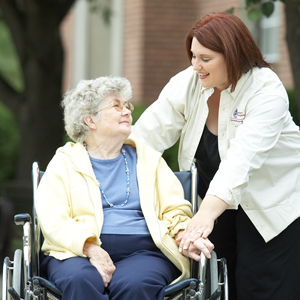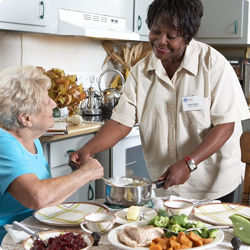Tips to Prevent Social Isolation in Seniors.
Blog | December 6, 2016
Humans are social creatures by nature, and our need to feel connected to others never goes away. As we age, however, connecting with others can become more challenging. Health issues that affect mobility, energy and communication can be especially isolating.
According to a 2014 National Seniors Council report, social isolation is the number one emerging issue facing seniors in Canada. Positive social connections play an important role in maintaining physical, mental and cognitive health. If you are concerned that you, or someone you care for, are experiencing social isolation, there are many ways to overcome limitations and improve social connectedness at any age.
Identify and Address the Barriers
Understanding what is preventing a person from engaging in social pursuits is key to clearing the path to social connections. Here are some common challenges seniors face, and links to information about how to address them:
- Physical disability that restricts mobility
- Difficulty accessing transportation (see below)
- Unrecognized and untreated hearing loss
- Anxiety—fear of falling, embarrassment about health conditions such as incontinence
- Depression, lack of energy, lack of motivation
Finding and Facilitating Social Opportunities
When circumstances make socializing difficult, social skills can begin to atrophy and lead to discomfort in being around other people. Just as starting a new exercise regime can be uncomfortable, you or your loved one may resist the idea of amping up social interaction. But it’s a muscle that needs to be worked and built with patience. If the desire to interact with others seems absent, it’s best to start small.
Having a regular, reliable companion can go a long way in providing the mental and social stimulation required to remain healthy and independent, particularly in cases where leaving the home is difficult. Companions can provide anything from a conversation, to help with hobbies and crafts or practical tasks such as light meal preparation.
If outside activities are manageable, it’s important to facilitate them where possible. If needed, our companions can be involved in supporting participation in activities outside the home. Seniors who are new to relying on assisted transportation may be hesitant to try it. If possible, assist them through the process at first, and ensure they can access it independently, for example by posting a list by the phone of information they need.
Finding suitable activities in the community can be as easy as taking the time to search online together. Most communities have activities and groups specifically tailored for seniors. Other activities to discuss and consider include:
- Faith-based activities, which can lead to a variety of social connections and opportunities
- Interest groups such as those that focus on bird watching, photography or collecting
- Adult learning opportunities, such as art, languages or hobbies
- Music-related activities, such as choirs, group lessons or open mics and jams
- Book clubs, knitting and quilting groups
- Volunteer opportunities such as fundraising, baby-cuddling and reading with children
The social, emotional and cognitive benefits of participating in these kinds of activities are high. Pursuing interests of personal significance provides people with a sense of purpose. Research shows that maintaining a sense of purpose is protective against the onset of depression in seniors. Taking the time to build and maintain a clear path to social opportunities may be one of the most important things you do to ensure the preservation of health and independence.
For more information about our Companion Care Service, or any of our other support services, please contact us for a free in-home consultation.
Individualized Home Care Options
Long-Term Home Care, 24 Hour Home Care & Short Term Care Options Customized for You







